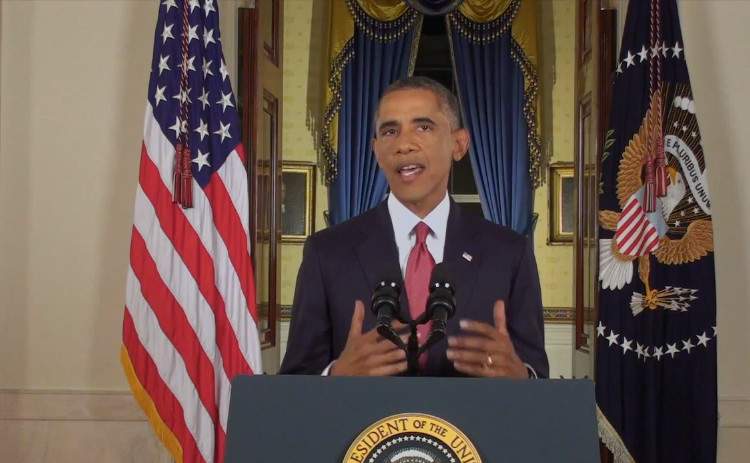The Pentagon announced Monday that the US has officially expanded its airstrikes in Iraq against ISIS, less than a week after President Obama laid out in a nationally televised speech his strategy to “degrade and ultimately destroy” the Sunni militants who have laid siege to large swaths of the war-torn region.
Obama’s decision to increase air strikes against ISIS, which calls itself the Islamic State and also goes by ISIL, came after two American journalists were beheaded by the militants, making ISIS a household name, and raising fears at home that the terrorist group could attack the US.
In order to “eradicate a cancer like ISIL,” as Obama said, the administration will send 475 additional American troops to Iraq to support and train Iraqi and Kurdish forces, as well as assist with intelligence gathering. The president also said he’d take action in Syria if need be. Prior to Obama’s speech, the military had already conducted 150 strikes in Iraq to support Kurdish and Iraqi forces on the ground.
Before Obama even announced his strategy to combat the extremists, a WSJ/NBC poll found that 61 percent of Americans said military action against the group is in the nation’s best interest. More than a third said they’d support both airstrikes and sending ground troops into Iraq.
So, America is rallying behind their commander in chief. But is this war legal on Constitutional grounds?
The administration insists that it has the authority to bomb ISIS without Congressional support because of the 2001 Authorization to Use Military Force Act and the Use of Military Force Against Iraq Resolution of 2002—two laws that the White House has said it would like to see repealed.
The 2001 authorization allows the government to use armed forces against those responsible for attacking the US on Sept. 11, 2001, meaning al Qaeda. The 2002 law authorizes using military force against those same perpetrators and enables the president to “defend the national security of the United States against the continuing threat posed by Iraq.”
Obama, in his remarks in May 2013 at the National Defense University in Washington D.C., said he intended to “engage Congress about the existing Authorization to Use Military Force, or AUMF, to determine how we can continue to fight terrorism without keeping America on a perpetual wartime footing.”
“Groups like AQAP [al Qaeda in the Arabian Peninsula] must be dealt with, but in the years to come, not every collection of thugs that labels themselves al Qaeda will pose a credible threat to the United States,” he said. “I look forward to engaging Congress and the American people in efforts to refine, and ultimately repeal, the AUMF’s mandate.”
Less than two months ago, Susan Rice, Obama’s national security advisor, sent a letter to House Speaker John Boehner in which she called the 2002 resolution “outdated” and reiterated the administration’s belief that it should be repealed.
“With American combat troops having completed their withdrawal from Iraq on December 18, 2011, the Iraq AUMF is no longer used for any U.S. government activities and the Administration fully supports its repeal,” she wrote.
But neither law has been repealed or amended. Instead, they are both currently being used to justify airstrikes in Iraq and possibly Syria.
In last week’s speech, Obama asked for Congressional support to train and equip so-called moderate opposition forces in Syria who have been fighting Syrian President Bashar Al-Assad’s regime.
In a background call with reporters before Obama’s speech, an unidentified senior administration official claimed that the AUMF gives Obama legal justification to use military action against ISIS, and passed the 60-day extension period as stipulated in the War Powers Resolution.
“We do not believe the President needs that new authorization in order to take sustained action against ISIL,” the senior administration official said. “We believe that he can rely on the 2001 AUMF as statutory authority for the military airstrike operations he is directing against ISIL, for instance.”
The Obama administration often cites the AUMF when conducting airstrikes against affiliates of al Qaeda, as well as when it targets US citizens. ISIS, which the senior government official told reporters last week “has roots in al Qaeda in Iraq,” was recently disavowed by al Qaeda and is now acting on its own.
Obama’s plan appears to have garnered uncharacteristic bipartisan support, but with many in Congress up for re-election this fall, as The New York Times points out in a scathing rebuke of Obama’s legal justification, it’s unclear if Congress wants to vote for the air strikes, even though it’s the only branch of government allowed by the Constitution to declare war.
Although Republicans in Congress have criticized the president for taking unilateral action in the past, they have been silent about him superseding their authority in fighting ISIS. But they will likely vote for arming the moderate Syrian opposition, which could force the administration to defend its strategy.
However, there will be no such debate about going to war.





























